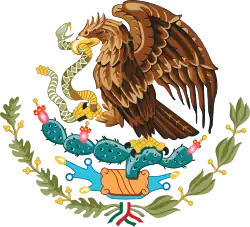La Década Perdida
"La Década Perdida" ("The Lost Decade") is a designation to the financial period of crisis in Latin America during the 1980s (and for some well into the subsequent decade). Sometimes the term is used in exclusive reference to Mexico & Guatemala.[1]
Part of a series on the |
|---|
| History of Mexico |
 |
| Timeline |
|
|
After the petroleum boom previous to the government of Mexican president José López Portillo (from 1976 to 1982), the Mexican government began to rely heavily on export barrels to support the financial needs in the country. These exports were mainly directed towards the United States, mainly due to the 1973 oil crisis, taking advantage of the high prices these barrels garnered.
When the market finally settled, thus reducing the high prices per barrel, the financial stability of the country was endangered. Diversification of income would have prevented the problem, but due to the inability of other production sectors to make up for the reduced profit, Mexico had to inflate the currency to by then historic levels. The Mexican peso would then be devaluated by almost 500%. Given these circumstances, López Portillo nationalized all financial institutions in 1982, during his last public address to the nation by saying: "Defenderé el peso como un perro" ("I'll defend the peso like a dog").
During the next period, president Miguel de la Madrid tried to bring back foreign investment and new trade agreements, culminating with Mexico's admission to the General Agreement on Tariffs and Trade (GATT) on January 1986 and also his proposed "Economic Solidarity Pact" in 1987, which finally put inflation under control, which averaged 100% until that time.
See also
References
- Ayau Cordon, Manuel Francisco (1993). La Década Perdida. Guatemala, Guatemala : Centro de Estudios Económico Sociales - CEES.
External links
- Pazos, Luis (1983). Devaluación y Estatismo en México. Diana. ISBN 978-968-13-0811-7.